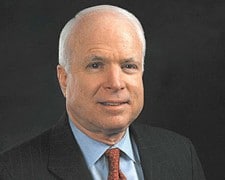 Senator John McCain returned to his old haunts in the Senate Commerce Committee hearing room to make the case for his Television Consumer Freedom Act. Here is his full opening statement:
Senator John McCain returned to his old haunts in the Senate Commerce Committee hearing room to make the case for his Television Consumer Freedom Act. Here is his full opening statement:
“Thank you both for extending me the courtesy to deliver an opening statement this morning at this important hearing. As a former Chairman of the Commerce Committee, it’s great to be back here today.
“As you know, last week I introduced the Television Consumer Freedom Act. This bill would provide consumers with the option to purchase television channels on a per channel basis, also known as ‘a la carte,’ rather than the tiers of programming that are currently offered by satellite and cable companies.
Basically, I support a la carte (and, I believe, most Americans do) for the basic reason that consumers should not have to pay for television channels they do not watch and have no interest in watching.
“My legislation uses existing statute and regulations as incentives to encourage the retail and wholesale distribution of television channels on an ‘a la carte’ basis.
“Opponents of my legislation will argue the government should stay out of the television industry. But obviously that view overlooks the government’s existing presence throughout the market – in the form of legal benefits like the compulsory copyright license, syndicated exclusivity and network non-duplication.
“It is time, in my view, to restore the proper operation of the market by empowering American consumers. My bill does this, and has already garnered the support of Consumers Union and Free Press. These groups recognize that ‘a la carte’ channel options are the right thing to do and popular with consumers in large part because of rising cable prices, which are dramatically outpacing cost of living. According to the most recent FCC pricing survey, since 1995 the average monthly cable bill for expanded basic service – the most popular tier – has gone up from about $25 a month to $54 a month today. That’s a 6.1 percent annual increase, or a more than 100 percent total price hike, over the past 16 years.
“Consider the following story offered by a cable executive on the significance of ‘a la carte’ channel options. He says: ‘My next-door neighbor is 74, a widow. She says to me, ‘Why do I have to get all that sports programming?’ She has no idea that in the course of a year, for just ESPN and ESPN2, she is sending a check to Disney for about $70 even though it goes unwatched. She would be apoplectic if she knew.’
“Particularly in today’s challenging economy, $70 is a lot for Americans all across the country.
“Admittedly, I am a sports fanatic and I love ESPN. I stay awake many nights in Washington watching games back in Arizona that don’t end until well after midnight. And while I’d never go without ESPN, the fact is that many TV consumers have no interest in sports programming and should not be forced to purchase it. What many of these Americans are beginning to realize is that included in their cable bill is a charge of about $10 per month to just carry sports programming like ESPN which cost nearly $5 a month – and even less popular channels like Regional Sports Networks, which can be almost as expensive.
“Another issue addressed in my bill is channel bundling. ‘Bundling’ is when individual channels are ‘tied’ together by a television programmer and sold to a pay-TV company in packages. But, once again, do consumers actually want bundles? The answer appears to be no.
“According to Neilsen statistics, in 1995 the average cable household was sold 41 channels, but only tuned-in to 11. In 2008, the last year these statistics were compiled, the average cable household was sold 130 channels, but tuned-in to only 18. These excess channels are driving up cable bills.
“Companies like Viacom don’t sell channels like MTV and VH1 individually, but rather bundle them together, which then leaves pay-TV companies with little choice but to do the same to consumers. This bill says that if you ‘bundle’ your programming on the wholesale level, then you also must ‘unbundle’ (that is, distribute your programming a la carte) too. So, the choice remains with the programmer. And, the outcome for the consumer is ‘a la carte’ – and a lower cable bill.
“In addition to a la carte, the Television Consumer Freedom Act ensures that the public’s spectrum resources are used in the most efficient and publicly beneficial ways possible.
“Finally, my bill seeks to end sports blackouts for teams that play in publicly financed stadiums. The antiquated government blackout rules were created in 1975 and are unfair to taxpayers who finance the vast majority of major stadiums these days.
“I strongly believe that consumers are at a tipping point when it comes to their monthly pay-TV bill. In my view, this ‘a la carte’ option is a non-regulatory and consumer-friendly way to provide consumers with the freedom to lower their bills and pay only for what they watch. This Committee has the opportunity to address these challenges and afford consumers the freedom to help reshape the marketplace for the next generation. I hope you take advantage of this opportunity.
“Thank you again for the opportunity to deliver my statement today.”





